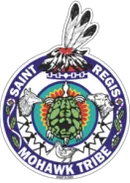
AKWESASNE – The Saint Regis Mohawk Tribal Council continues to seek environmental justice for the Akwesasne community by engaging in federal processes aimed at improving tribal consultation. On Kentenhkó:wa/November 10, 2016, Tribal Chiefs Beverly Cook and Eric Thompson spoke on the Tribe’s concerns of tribal consultation specifically for infrastructure development projects with the Department of Interior, Department of Justice, Department of Agriculture, Department of Energy, U.S. Forest Service, Advisory Council on Historic Preservation, Environmental Protection Agency, and the Federal Permitting Improvement Steering Council at a session hosted by the Passamaquoddy Tribe. At the same time, Tribal Chief Ron LaFrance traveled to North Dakota to extend the Tribe’s ongoing solidarity with the Standing Rock Sioux in their opposition to the Dakota Access Pipeline.
“The session provided a chance to voice our community’s frustration in regards to the consultation process within the existing structure of the Environmental Protection Agency; particularly in regards to the selection, implementation and monitoring of the remediation methodology at the former-General Motors/RACER and the Grasse River Superfund Sites,” stated Tribal Chief Eric Thompson. Chief Thompson added, “We shared our experiences with federal infrastructure projects, starting with the St. Lawrence Seaway, where no consultation existed and resulting industries are being allowed to leave an environmental legacy of environmental pollution. As a result, we insisted upon the need for uniformity within the process, clearer communication from federal agencies, and greater weight given to tribal opinions—including an appeal process for seeking recourse when our recommendations are disregarded.”
The consultation session was the result of an invitation extended to tribal leaders by the Department of the Interior, Department of Justice and the Department of the Army on Seskehkó:wa/September 23rd to discuss how federal agencies should improve processes for obtaining tribal input when determining and implementing federal policies or activities related to major infrastructure projects that have direct tribal impacts. Since then, the federal agencies have convened consultation sessions throughout the country.
“The Tribe continues to seek meaningful consultation with federal agencies, such as the Environmental Protection Agency, to share our concerns about the remediation plan for the former-General Motors and the Grasse River Superfund Sites that are upwind and upriver of our territory,” said Tribal Chief Cook. Chief Cook noted, “New research indicates a direct link between the development of type 2 Diabetes and disruption of women’s ovulatory cycles from inhaling lower congener PCBs in the air. This is a crucial piece of knowledge that was missing when the cleanup plans were originally designed. We will continue to raise these concerns and strongly advocate for the mandatory participation of our environment staff in the development of these plans, as opposed to a cursory opportunity to review and make comment on something developed without our input.”
The New York State Department of Environmental Conservation recently classified the Grasse River as posing “a significant threat to public health and the environment” due to contaminants released by ALCOA. With this new classification, tribal chiefs went to the consultation session hosted by the Passamaquoddy Tribe to urge for more consideration of remediation plans presented by tribal communities. They continued to urge for a cleanup plan for the Grass River that will exceed the one currently being completed with the EPA’s approval at the former-General Motors, which allows PCB-contaminated sediment to remain at the site.
Tribal Chiefs reiterated three recommendations that were previously presented by Tribal Chiefs Cook and Thompson, along with Sub-Chief Michael Conners, during a roundtable discussion with members of the U.S. House Committee on Natural Resources and the Subcommittee on Indian, Insular and Alaska Native Affairs on Ohiarí:ha/June 14, 2016 which contributed to Congressman Dr. Raul Ruiz (D-CA) requesting an investigative report from the U.S. Governmental Accountability Office on the effectiveness of government-to-government consultation. They recommended the need to codify the requirement of free, prior, and informed consent; hold developers accountable for mitigation costs, including damages; and ensure meaningful consultation in all stages of the decision-making process for development projects that have a direct and real impact on tribal communities.
During the same week, Tribal Chief Ron LaFrance traveled once more to the Standing Rock Sioux Reservation to express our community’s ongoing solidarity in their opposition to the Dakota Access Pipeline. Following his first visit with Sub-Chief Cheryl Jacobs in Seskéha/August 2016, Chief LaFrance returned with a contribution of $10,000 on behalf of the Saint Regis Mohawk Tribe to help the Standing Sioux with legal costs in their effort to prevent an environmental injustice from taking place in their traditional territory.
“We want the people of Standing Rock to know they are not alone in their fight to protect their source of clean water,” said Tribal Chief LaFrance. Chief Lafrance added, “Their fight to stop crude oil from contaminating their water is everyone’s fight; Native and non-Native, environmentalists and non-environmentalists, and the millions of other people downriver that need clean drinking water to survive. What’s happening in Standing Rock is the result of the federal government’s historical failure to engage Tribes in meaningful consultation and to include us in the decision-making process for federal actions that directly impact our communities.”
The Saint Regis Mohawk Tribe will continue to seek environmental justice and encourages the continuation of tribal consultation sessions initiated by the Obama Administration throughout the Trump Administration.
-----------
PHOTO CAPTION: Saint Regis Mohawk Tribal Chiefs Eric Thompson and Beverly Cook took part in a tribal consultation session on infrastructure projects with federal agencies during an event hosted on Kentenhkó:wa/November 10, 2016 by the Passamaquoddy Tribe. Chief Thompson spoke about the environmental impact of industrial development from General Motors, ALCOA and Reynolds Metals upstream and bordering Akwesasne’s territorial boundaries.
# # # #
The Saint Regis Mohawk Tribal Council is the duly elected and federally recognized government of the Saint Regis Mohawk People.

